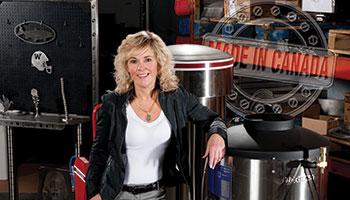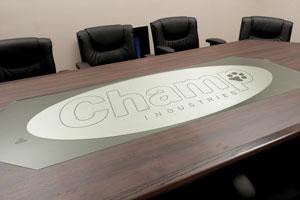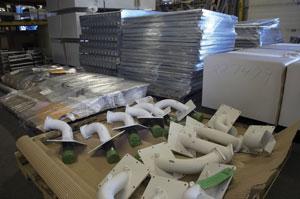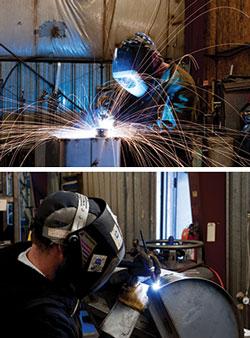- FMA
- The Fabricator
- FABTECH
- Canadian Metalworking
Delivering Car Washers, Fuel Tanks, and More
Champ Industries produces components on both sides of the border
- By Sue Roberts
- July 12, 2013
- Article
- Made In Canada

Lise Baker is general manager of Champ Industries, which supplies stainless steel components and assembly for Magikist car wash units.
Lise Baker, general manager of Champ Industries, Winnipeg, Man., entered the world of metal fabricating at the urging of David Bridges, then owner and her stepfather. He had purchased a small, 5,000-sq.-ft., five-employee company in 1992 and expanded it to 55,000 sq. ft. and 60 employees in only six years.
“The company was rapidly growing and I was asked to help manage,” said Baker, whose nursing background is augmented by management experience. “I joined the company in 2004.”
Baker focuses on accessing the skills of the company’s workforce. Employees contribute to decisions that move the company forward. “It’s not my style to micromanage. I ask what I can do to help get a job done and give the employees the autonomy to do what is needed. Our employees determine how to do a job and make it their own.”
Glass Washers to Components
In 1967 a teenage Bridges was hired by industrial glass washer manufacturer Paul Moore Co., also in Winnipeg. By 1988 Champion Industries had purchased the company and Bridges had taken the lead as general manager.
“It was a big step for him,” said Baker, “but he had a keen sense of fabrication. He did a lot of soul-searching and reflection and took the step to ownership.” Renaming the company Champ Industries wasn’t a shortening of the previous name, it was a loving nod to Bridge’s favorite childhood dog. A paw print is tucked inside the letter p in the company logo.
There was one problem with manufacturing quality glass washers: The equipment would be 25 or 30 years old and still running well. New product orders were not increasing, but Bridges recognized the opportunities available to help other companies meet their metal fabrication needs. Diversification began, and the risk paid off.
Bridges used his contacts to develop relationships with local OEMs and became skilled at developing component parts for other customers. By 1998 Champ had outgrown the original shop and moved to a 30,000-sq.-ft. facility at its current location. Two years later, an expansion to 55,000 sq. ft. nearly doubled the company size. As need for capacity grew, more people, equipment, and shifts were added.
Steady Growth From New Technology
“The key thing that helped my stepfather develop his business extremely quickly was the purchase of a laser cutting machine. Prior to that shears, punches, and saws did the majority of the work. Now nearly everything starts at a laser. It’s much faster with greater precision and accuracy,” Baker said. The first flat laser was quickly joined by three others, along with CNC brakes. A recent addition is a 20-ft. TRUMPF® TruLaser 7000 tube laser with automation.
“A lot of our work for current customers required tube processing. We thought the tube laser would help us do the work quicker, become more competitive, and allow us to reduce our costs and extend the savings to our customers,” said Baker. “And it diversified our business. With the tube laser there were new processes that we could implement in order to reduce waste, improve operational efficiency, and reduce costs. We were able to help many of our customers consider a redesign of their products to improve upon the overall manufacturing process and costs.”
Along with the significant growth and diversification that the tube laser offered, a fourth flat-sheet laser was added to meet the increasing demand.
Today 90 employees keep components and assemblies moving out the door three shifts a day, five days a week. Canadian Welding Bureau-certified welders make up 30 percent of the workforce, creating welded assemblies for everything from small components to large frames for the transportation and agricultural industry.
From Glass Washers to Car Washers
Equipment for cleaning glasses transitioned to equipment for washing cars. Magikist®, a Winnipeg distributor of car wash equipment, became a key component in the success of the company and continues the relationship today. “Magikist manufactures the majority of the car wash equipment you see in North America—the vacuum towers, the pressure washers, and the car washes that you do by hand with a wand. We provide the components,” Baker said.
These components for the Magikist units are basically produced from thin-gauge stainless cut on a laser, sent to the punch for added features, formed on the brake, and sent to one of the 30 welding stations for assembly. “Cosmetics are very important. We have to make sure the final product is without any scratches,” said Production Manager Joseph Habtemicael, who joined the company as a finisher after immigrating to Canada from Africa over 30 years ago. “We have first-off quality inspection and continue with in-process inspection for all of our jobs.”
ISO 9001:2008 certification helps keep the focus on quality.
“We have approximately 3,000 active parts. We ship 642,000 parts a year, almost 700 shipments a week,” said Baker. The company stocks a limited number of parts for a handful of customers, but most jobs are just-in-time. Flashing signs located in the production bays praise and thank employees for achieving nearly perfect, 99.94 percent, on-time delivery.
Seventy other companies join Magikist on the Champ customer roster. Components typically go to the transportation, agriculture, aerospace, food service, and commercial manufacturing industries. All come under the category of original equipment manufacturer. Of the seemingly endless component configurations that flow across the floor, 47 percent are produced from mild steel, 47 percent from stainless, and 6 percent from aluminum.
Various fuel tanks and frames are produced for the transportation industry. Habtemicael explained that the fuel tanks require added steps to meet certifications. “Once welded, each tank goes to our test area to make sure it is 100 percent leak-proof before it goes to painting. There are absolutely strict certifications, everything has to be to standards, and they have to last 10 years. In some tank configurations, the welds need to be done from the inside.”
Crossing the Border
Jamestown, N.D., became the home of Champ’s second facility andit is outfitted with equipment to provide the same production services—laser cutting, bending, welding, and assembly. It started production in 2006 in a 10,000-sq.-ft. building and experienced the same success and growth as the shop in Winnipeg. After only two years, customer demands necessitated expansion. A larger building in the same city met the space needs and added to overall production capacity and capabilities.
“Now we have a 37,000-sq.-ft. manufacturing facility and we were lucky enough to find a building with a powder coating booth,” said Baker. “In Winnipeg we outsource that function locally.”
The Baker Touch
Bridges, who passed away in 2007, left the company in good hands. Dedicated people with core skills on the shop floor and Baker’s team approach to management ensure that the company’s success will continue.
For the future, Baker sees steady growth, maintaining and building new relationships, and continuing with their ongoing commitment to new advances in technology.
“Our success is about our people,” said Baker. “It started because of David’s dream and skill and has continued because of our people. I’m here to facilitate and motivate, but they are the ones who do the incredible work.”
Feeding the Need for Welders
Good, experienced welders are needed to meet the production needs of Champ Industries. However, the company knows that the experience needs to begin with good training. “Based on this principle, our welding supervisor and production manager has been involved with two local welding programs as part of the Advisory Committee to share his experience and narrow the gap between school and industry,” said Lise Baker, general manager of Champ Industries.
Red River College
The Notre Dame Campus of Red River College offers a seven-month certificate program open to Manitoba residents. Participants learn gas tungsten and gas metal arc welding, along with mathematics, science, industrial communications, and blueprint reading. Upon graduation they receive a Red River College certificate and a student CWB ticket.
“We work in collaboration with the college and provide work experience for students just before they graduate. We have them here for the last two weeks of the program to provide work experience. If any of those students is interested or shows a particular skill, we’ve been known to hire them,” said Baker.
Neeginan Institute of Applied Technology
Neeginan Institute of Applied Technology, a postsecondary training division of the Centre for Aboriginal Human Resources Development, is funded by the federal Aboriginal Skills and Employment Training Strategy program.
Baker said, “This is an excellent program. The work center offers underpriviledged First Nations, Métis, and Inuit people the opportunity to learn welding at no cost. This program has been helpful in supplying welders for the manufacturers in our area.”
subscribe now


Keep up to date with the latest news, events, and technology for all things metal from our pair of monthly magazines written specifically for Canadian manufacturers!
Start Your Free Subscription- Trending Articles
- Industry Events
MME Winnipeg
- April 30, 2024
- Winnipeg, ON Canada
CTMA Economic Uncertainty: Helping You Navigate Windsor Seminar
- April 30, 2024
- Windsor, ON Canada
CTMA Economic Uncertainty: Helping You Navigate Kitchener Seminar
- May 2, 2024
- Kitchener, ON Canada
Automate 2024
- May 6 - 9, 2024
- Chicago, IL
ANCA Open House
- May 7 - 8, 2024
- Wixom, MI

















